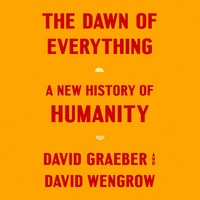Take a photo of a barcode or cover
Let me be clear, I do think there are occasional issues with the analysis in this book, it is not perfect - Graeber & Wengrow push beautifully back against ideas of inevitable progress and the ways that many people cast ideas back into history based on the state our current world has reached. However, they at times, I think, fall into this trap themselves with speculative reimagining instead of sitting in the discomfort of “we can’t know with our current evidence”.
This caveat aside, it is such an important read for anyone looking at historical politics and anthropology, at least if you’re getting started. They push back on arbitrary and harmful assumptions by people like Jared Diamond and Yuval Hariri, the latter of whom seems to have essentially written fiction in his books and been celebrated for his ideas based on wild speculation and heavily cherry-picked evidence. I think world history generally does suffer from a teleological fallacy and overspeculation, and I thought the decentering of an Aristotelian constitutional cycle and other such ideas is an important contribution. Further, though, I think it is most needed in that it reminds us of the complexity and diversity of the human experience and history, and that much is possible if we are willing to imagine. I think they whaled on schismogenesis a little too much but it’s strikes me as a very real and plausible idea - we do seek to create in-groups and out-groups all the time, and it happens on larger scales. And the idea of play, while maybe a bit infantilizing in certain discussion (why is one type of war just war and another a play war - depending on how deeply you go down, all wars could be argued as a kind of staged or arbitrary action) is a good reminder of unstructured human nature. I enjoyed the categorizing of three rules of freedom, a good way of setting up the general argument. Overall, everyone should set aside Hariri and just read this instead.
This caveat aside, it is such an important read for anyone looking at historical politics and anthropology, at least if you’re getting started. They push back on arbitrary and harmful assumptions by people like Jared Diamond and Yuval Hariri, the latter of whom seems to have essentially written fiction in his books and been celebrated for his ideas based on wild speculation and heavily cherry-picked evidence. I think world history generally does suffer from a teleological fallacy and overspeculation, and I thought the decentering of an Aristotelian constitutional cycle and other such ideas is an important contribution. Further, though, I think it is most needed in that it reminds us of the complexity and diversity of the human experience and history, and that much is possible if we are willing to imagine. I think they whaled on schismogenesis a little too much but it’s strikes me as a very real and plausible idea - we do seek to create in-groups and out-groups all the time, and it happens on larger scales. And the idea of play, while maybe a bit infantilizing in certain discussion (why is one type of war just war and another a play war - depending on how deeply you go down, all wars could be argued as a kind of staged or arbitrary action) is a good reminder of unstructured human nature. I enjoyed the categorizing of three rules of freedom, a good way of setting up the general argument. Overall, everyone should set aside Hariri and just read this instead.
informative
slow-paced
hopeful
informative
inspiring
reflective
medium-paced
I have a hard time assigning a star rating to nonfiction books, because what do I know? I personally feel like I can’t place a value judgement on something like this without looking into their sources and knowing whether all their arguments are backed up or not, which I am neither qualified to do nor interested in doing. However, I think the basic argument that there’s a lot that we don’t know, and that humans have been organising themselves in a multitude of ways since the beginning of time, is pretty irrefutable. I also think it’s a very important argument to make at a time when so many people feel that we are stuck with our current system until it eventually brings about the end of the world.
I found the first 150 pages really compelling and easy to read, I thought the argument that the European enlightenment was heavily influenced by the criticisms of European culture posed by Indigenous North Americans was well argued and made sense. The firsthand sources from French Jesuit missionaries were really interesting, and I guess I never really thought about the philosophical discussions between individuals that would have been happening while the missionaries were trying to convert everyone to Christianity.
I lost momentum during the middle of the book when it got deep into ancient history and a lot of archaeological case studies. I thought everything was reasonably well explained without oversimplifying things, but I have such a low baseline knowledge of that area of study that I got a bit lost in the sauce (I do NOT think about the Roman Empire). It also jumped around in time a lot in time and place, and as someone whose eyes glaze over when they see a date, that got a little confusing.
I was definitely more invested in the philosophical aspect of the book where they unpack the “origins of inequality” and whether that is even a useful question to be asking. Their theory that freedom requires three basic tenants: freedom of movement (the ability to leave a community you are not happy with and be welcomed somewhere else), the freedom to disobey leadership, and the freedom to redefine social relationships. The case studies where whole cities who were ruled by a cruel king/leader just up and left and moved far enough away that his power couldn’t control their lives, was illuminating to me because it’s so foreign to what is possible in today’s world.
The writing was pretty sassy at times, which I can see how some might find irritating, but I felt it kept things engaging. The book as a whole develops some really important frameworks and questions we need to be asking ourselves when envisioning what we want the future to look like, and points out the commonalities that all oppressive societies share. Definitely gave me some food for thought.
Cover Design Rating: 4/5, pretty boring but I like the colours and it gets the job done. One might even say that the visual simplicity reflects the text’s rejection of grandiose myths about the nature of humankind.
The field of anthropology was badly in need of some updated synthesis work, and the labor of love that went into this fascinating title definitelyshows through. The Davids Wengrow and Graeber did a deeply impressive job turning disparate evidence into a coherent thesis. "It starts by asking better questions." Modern mindsets really do our distant ancestors a great disservice, and we continually underestimate their wisdom, foresight, self-knowledge, and altruism (not to mention their wariness of the folly of greed, sexism, and unchecked power). This book will change your perspective on just about everything around you, and hopefully lead you to some of the deep thinking that it provoked in me too, because I feel wiser for it. If you have that sense you live in a diminished, hostile, declining civilization, then maybe its not so unhealthy to feel a bit more alienated from it, and I mean that in the best way possible.
It really reminds me of a hot take I heard about the Roman Empire once: are they really the benevolent lawgivers of western civilization, or are they only the bedrock of our society because they genocidally conquered everyone who disagreed with them? If you make it through this book in less than the year it took me (I had to put it down for some others in the meantime), you may also feel the sense of wonder that I experienced at the conclusion, where we find out that a certain New World archaeological assemblage, treated solely as a footnote to this point, may have indirectly and unintentionally become the most influential organized society in all of human history.
It is sad that Dr. Graeber couldn't live to see the reception his work has received, and I do hope that Dr Wengrow can complete the two follow-up titles they had planned.
It really reminds me of a hot take I heard about the Roman Empire once: are they really the benevolent lawgivers of western civilization, or are they only the bedrock of our society because they genocidally conquered everyone who disagreed with them? If you make it through this book in less than the year it took me (I had to put it down for some others in the meantime), you may also feel the sense of wonder that I experienced at the conclusion, where we find out that a certain New World archaeological assemblage, treated solely as a footnote to this point, may have indirectly and unintentionally become the most influential organized society in all of human history.
It is sad that Dr. Graeber couldn't live to see the reception his work has received, and I do hope that Dr Wengrow can complete the two follow-up titles they had planned.
Great book! It did read a little bit like a textbook because of how organized and scientific it was, but it was also very enjoyable. I learned a lot reading this book and will definitely go back to reread some of the chapters. I recommend it to you if you like anthropology or sociology and want to learn more about the topic.
Certainly interesting. However, the book didn’t need to be as long as it is. Glad I read it. Wish it was better edited.
An incredible book and much needed reminder of human possibility.
challenging
informative
reflective
slow-paced
adventurous
informative
reflective
medium-paced



